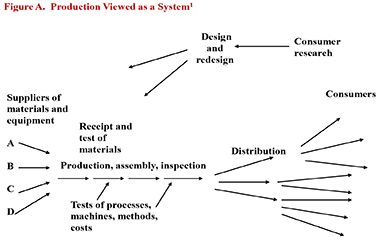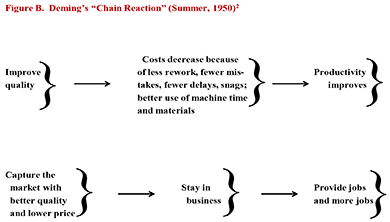Absence of Long-Term Constancy of Purpose
"Why is Deming not more broadly applied today?"
I belong to several groups on the Linked In web site, and I find many of their posts to be both interesting and informative. Recently, a member of the W. Edwards Deming Institute group posted some commentary under the question, “Why is Deming not more broadly applied today?” It generated a large number of responses, and I chimed in. Later, I drafted the following more extensive essay on the question.
I believe Deming is not more broadly applied today for the same reason his principles have never been broadly applied. The reason is a lack of long-term constancy of purpose. This is not just a symptom of American or western management practices, either. I observe the same barrier in other cultures, too.
Dr. Deming was first broadly thrust into the consciousness of American managers with the 1980 broadcast of the NBC White Paper, “If Japan Can, Why Can’t We?” Many people misinterpreted the program’s message, however, to be that all of Japanese business bought into Deming’s message and were applying his principles and methods. The proclamation of the success of a “Japanese Management Style” was a myth, and more recently “The Toyota Way” has been misinterpreted to be “The Japanese Way.” This was not even true in the sixties and seventies, when Deming’s work was credited with Japan’s emergence as a world economic power. In fact, most of Japan rejected (and continues to reject) Deming for the same reason that most of the west rejected (and continues to reject) him.
According to his text, Out of the Crisis, Deming first started teaching his principles and those of Walter Shewhart to Japanese executives and managers in 1950. He set the stage for his series of lectures by presenting a new view of “production as a system.” (See Figure A.) Many managers in his audience were intrigued with the model, because they had never before viewed suppliers as an integral part of their production system.

As the lectures continued, Deming promised that if Japan were to adopt and apply statistical method as a method of management, the following chain reaction would occur. He elaborated on the “chain reaction” theme with the illustrations shown in Figures B and C.
- The quality of their products would go up;
- Automatically, costs would go down because of less rework, fewer delays and snags, and better use of time and materials;
- Productivity would immediately improve for the same reasons; then,
- Lagging somewhat, because it takes time to build reputation in the marketplace, their competitive position would improve. Deming promised that they would enter world markets within five years and they would capture world markets due to better quality and lower price within ten years.
And there was a flood to the door, never to return. Very few attendees remained.

This was post-war, 1950 Japan; parts of the country still devastated and buried in rubble from World War II. Some people didn’t know what they were going to eat next month. And here’s some gaijin from the U.S. promising them that they’ll capture world markets in ten years! Many executives held the view that if they couldn’t see a return on an investment within six months, they couldn’t afford to invest in it.
.png)
So, whenever I mention Japan in my writing or lectures, I always add this caveat: I’m talking about the best of the best; the approximately 20 percent of Japanese business organizations that accepted and applied Deming’s teaching. (The other 80 percent did not.) They proved to be a critical mass, however - look what they accomplished for the entire nation of Japan from the sixties through the eighties.
The Barrier Remains
Years later, Deming met with the CEO of one of the Big 3 automakers in the U.S. He encountered exactly the same reaction; i.e., “If we don’t see a return on an investment within six months, we can’t afford to invest in it.” Witnesses reported that Deming immediately ended the meeting and left the executive’s office, mumbling and growling about “ignorance.”
I once talked to Dr. Deming about how I should handle the frustration of having to deal with uninformed, short-term-thinking executives. He replied, “Take heart. Ignorance like theirs assures us job security!”
“Why is Deming not more broadly applied today?” Because managers – and not just American managers; managers around the world in all cultures – remain obsessed with short-term results and lack long-term constancy of purpose. All we can do is continue to teach his system of management and statistical method, and help them struggle to grasp the importance of long-term thinking and behavior.
Dr. Deming has already provided the advice we need to help managers and organizations get started on the necessary transformation:
“Management in authority will struggle over every one of the [14 points]…. They will agree on their meaning and on the direction to take. They will agree to carry out the new philosophy. Management in authority will take pride in their adoption of the new philosophy and in their new responsibilities. They will have the courage to break with tradition, even to the point of exile among their peers.”4
We don’t have to “sell” every manager; we don’t have to “convert” every organization. We just have to keep our eyes open for those with “the courage to break with tradition,” and help them. Then, as a small but critical mass of organizations begins to make meaningful progress, our entire nation will benefit and we will regain competitive position in world markets.
And my children and grandchildren will be the beneficiaries.
Notes
1W. E. Deming, Out of the Crisis, MIT Center for Advanced Educational Services, Cambridge, MA (1986), p. 4.
2Ibid., p. 3.
3Sketch commonly used by Dr. Deming during his four-day seminar, “Quality, Productivity and Competitive Position.”
4Deming, op. cit., p. 86.
© 2013 James F. Leonard.
